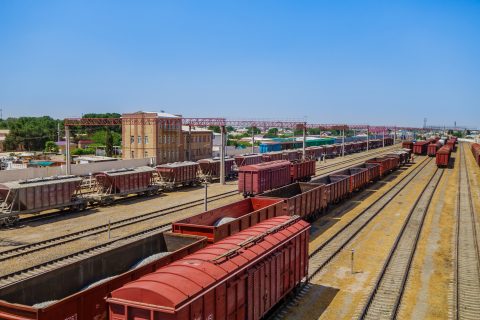Fesco bypasses Lithuania with St. Petersburg-Kaliningrad sea services

Russian intermodal company Fesco has recently launched new sea services between St.Petersburg and Kaliningrad that allows them to avoid crossing Lithuania by rail. LTG Cargo, the freight subsidiary of Lithuanian Railways, has in fact decided to reduce rail-borne volumes transiting to and from the Russian exclave via Lithuania in 2023.
The first Fesco sea service between the Russian mainland and the exclave bypassing Lithuania was launched at the beginning of February and connects Port Bronka, in St. Petersburg, and the port of Baltiysk, in the Kaliningrad region. This service was meant to serve cargo coming from Southeast Asia. The goods reach Vladivostock by sea, are moved on the rail to reach St. Petersburg, and then again via sea to Kaliningrad. Up until then, the goods would reach Kaliningrad by rail directly from Vladivostock.
The same initiative was repeated more recently for the connection between Moscow and Kaliningrad. Fesco had set up a rail freight connection from the Russian capital to the exclave in Lithuania in May 2020. However, on 20 March, Fesco stated that the service would be transformed into a combined rail-sea service. Goods travel on rail from Moscow to St. Petersburg and then, once again, they are loaded on ships to reach Kaliningrad.
Avoiding Lithuania’s stricter regulations
Fesco’s new initiatives can be linked to the fact that Lithuania decided to significantly decrease the volumes shipped from Russia via rail to Kaliningrad. LTG Cargo stated that it will allow the transit of 2,240,746 tonnes of cargo bound for Kaliningrad from Russia and 420,000 tonnes to transit in the opposite direction. Prominent in the transit volumes to Kaliningrad will be coal and steel products. In 2022, LTG Cargo moved roughly eight million tonnes of goods between Russia and its exclave.
The 420,000 tonnes that will run in the opposite direction will mainly concern timber and forestry product volumes exported from Kaliningrad to the Russian mainland. More specifically, in 2023 LTG Cargo will undertake the transit transport of 644,101 tonnes of coal and 471,736 tonnes of steel. LTG Cargo has clarified that it looks at each train service separately to determine whether the cargo can transit without breaking any sanction-related rules.
Also read:





Tells about importance of redundancy (robustness) – at supply chains…
Modes proving redundant and resilient (all except railways…) now handsomely are rewarded – by willingly paying clients.
(Short of robustness, railways urgently, simply should out all technicalities, now “bottlenecks”, at supply chains and at society!)
Electrification of railways, now a vital device at society, shall be redundant!
Track system, now devastating short of margin for upgrading, is due for a shift, etc…